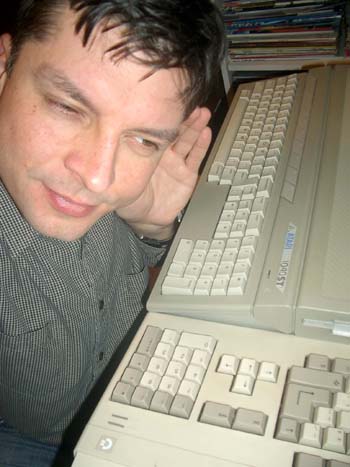

|

Sure they're getting faster, but not everything about them has gotten better. In fact, some things are worse. Have you ever noticed how quiet it suddenly gets when you turn off your PC? It's a pretty noisy piece of technology when you think about it. With all the motors inside it spinning fans, discs and hard drives - the average computer almost seems to have more in common with a lawnmower than a TV or phone.
Whereas a phone or toaster will sit there quietly and unobtrusively until it rings or pops, your PC likes to fill the room with a constant din in a seeming need to recreate the ambiance of the engine room of the Starship Enterprise. Sure that would be great if Tasha Yar were part of the package. But sorry, all you get is the engine noise to type your essays to.
Of course, you would be forgiven thinking this is a necessary evil since choosing a PC usually involves either picking the cheap beige boxy noisy computer or the expensive black boxy noisy computer. Or sometimes even the more expensive translucent glowing boxy noisy computer favoured by gamers.
But once upon a time computers were quiet.
You might not have heard of computers with names like Commodore Amiga, Atari ST (yes, the same Atari like on all the t-shirts) and Sinclair QL, but each of them were arguably technologically superior to the Microsoft PCs of the time. They were less expensive, and they were all gloriously quiet. Not just "quiet" like Mac people will tell you their iMacs are with their spinning hard drives, but actually quiet as in silent.
Back then, there were no articles in music magazines describing how to drill a hole in your floor so you can place your computer in the basement so that you could record music without your PC's fan providing all the backup vocals. Really. This is what it has come to.
So why didn't these other systems succeed? Well, before Microsoft was busy crushing companies such as Netscape, WordPerfect, WinZip, Stacker, etc. they were busy crushing companies such as Commodore, Sinclair and Amstrad and their silent computers.
Part of the reason Microsoft was successful in winning people over with a bigger noisier less capable system than the competition was that they knew the consumer's psychology.
For example, vacuum cleaners sold in North America are deliberately tuned to be as loud as possible, even at the expense of actual performance. Why? Because North Americans think louder vacuums work better. In other parts of the world such as Korea or Japan, where this bias is absent, aesthetics, performance and efficient size are more important, so manufacturers don't go out of their way to design an artificially loud machine. Manufacturers have learned it is far easier to market a product to exploit consumer ignorance than to educate them on the realities. And so it was in the eighties with computers; big, loud and expensive won over small, quiet and efficient.
Unfortunately, the same basic inefficient design is still with us today. Fortunately, there are rebels that buck the status quo. Musicians such as Fatboy Slim still use vintage 80s Atari STs for music production. Not only is the ST silent, but it also has built-in MIDI ports and doesn't ever stutter or hang like today’s systems do.
But hey, if we did it before, we can do it again. Just as we used to have supersonic passenger planes and rockets to the moon, if we care, we can have them again, and maybe, just maybe, we can have quiet PCs again too.

And now the
Mail:
Stone age computer hangover
By Vladyslav Kovryga
Re: "Why won't my computer shut up", Technology, February 2, 2005 I am in computer science, and was truly shocked to see those atrocious computers from the stone age being hailed for their quietness. Yes, they were quiet, but the fact is that modern processors run many hundreds of times faster than those in the 1980s, they can store hundreds (if not thousands) of times more data in RAM or on hard drive, and so forth.
Because of this enormous speed, hardware gets quite hot. In fact, heat is one of the major limiting factors in computer performance today. This is why there is a huge fan installed on every Pentium 4 processor, and also on some new video cards. Fans are sometimes installed on the computer case to circulate the air inside.
Some of those machines "favoured by gamers" have a fan on the side to get the air inside the case, and a fan on the back to get it out. There is also a fan inside the power supply unit, which pumps at least 300 watts to support processors and video cards. My video card alone consumes up to 90 watts - that's more than most light bulbs (which are of course tremendously hot).
And hey, here's the news - fans make noise! It's actually molecules of air colliding with each other and some surfaces, and you can't do much about it. If you really want your computer to be less noisy, if you really want to do some music recording at home, buy one of those new water-cooling systems. Have it professionally installed and your computer will be dead silent.
As for the idea that ancient computers were really quiet, I remember my hard drive of seven years ago. It made quite a lot of noise. My present hard drive, on the other hand, is so quiet that the only way I can tell if it's operating is by the indicating light on the case. And the old floppy drives made so much noise that they sounded a lot like some machinery on a plant.
Lastly, since the author mentioned the supersonic passenger planes, why didn't he mention that they were not allowed to cruise at supersonic speed over land when they were operational?
Why? Because they were too damn loud!
We here at the Naked Tech labs get lots of letters of letters and emails. Surprisingly many are from Nigerian diplomats and Italian Rolex dealers offering us amazing deals. To them I would like to say thanks, but no thanks – we cannot accept gratuities as it is firmly against company policy. Sorry. And people, if you’re going to write, learn to spell. “H0TT GRRLS L00king for S,tud” I mean, what’s that about? Well let me tell you, it took me $3.99/min to find out! Candi, if you’re reading this – I’ve thought about your suggestion but I just don’t see how it could possibly fit. Where do people get these ideas! Speaking of funny ideas, one reader wrote in regarding my article on the benefits of quieter computers. He says “I am in computer science, and was truly shocked to see those atrocious computers from the stone age being hailed for their quietness.” Stone age. Ha! There were no computers in the stone age. York University has a fine History department and to which I would recommend said reader to avail himself. He continues “Yes, they were quiet” Good, good, he agrees with a key premise – a very good turn for the better. But then things get decidedly worse with “the fact is that modern processors run many hundreds of times faster … Because of this enormous speed, hardware gets quite hot…This is why there is a huge fan installed…” Dear oh dear. What are they teaching in Computer Science these days? No matter, it is up to Naked Tech to set things straight. May I present to you exhibit A – the Apple Macintosh computer. Many of which have enormous speed compared to the computers of the stone age or even the 80s and many of which do not need noisy fans to cool them. What do they use instead? Good design of course. In fact, I’ve heard some Mac owners have even attempted to use their fanless computers to perform modern tasks such as web browsing and watching DVDs. It may be just a rumour, but I like to think it’s true. The reader then gets more heated (possibly needing a fan) and says “And hey, here's the news - fans make noise! It's actually molecules of air colliding with each other and some surfaces, and you can't do much about it.” He is, of course, correct. Fans make noise. This is in fact what I thought I was saying as well, but at least now we have the physics to back it up. He then continues “If you really want your computer to be less noisy … buy one of those new water-cooling systems. Have it professionally installed and your computer will be dead silent.” To which I would say, have you listened to your refrigerator lately? I hate to be the bearer of bad news, but refrigerators and water-cooling systems have something in common – motors. And motors have something in common with my phone-friend Candi - they make noise. Professionally installed or not. And then our faithful reader concludes with “Lastly, since the author mentioned the supersonic passenger planes, why didn't he mention that they were not allowed to cruise at supersonic speed over land when they were operational? Why? Because they were too damn loud!” Now, at this point I’m not sure whose side he’s on here since he 1) points out that people can dislike noise so much that they make laws against it and 2) admits that some technology can be “too damn loud” Well I’m not sure if he’s trying to use reverse psychology or something here, but I’m not falling for it. I totally agree. In a nutshell: people & sonic booms – bad. People & noisy computers - bad. Sonic booms over the ocean where people can’t hear them is fine with me (I’ll leave their effects on the whales to the environmentalists) just as I don’t mind certain letter writers listening to the sounds their video card fans and CPU fans and case fans while enjoying their MP3s. Hey, whatever turns you on. But for the rest of us that like our TVs, DVD players and radios without fans (and companies such as Microsoft are trying their best to change this) my article simply points out that our PCs were once silent and can be silent again. Silence is golden.